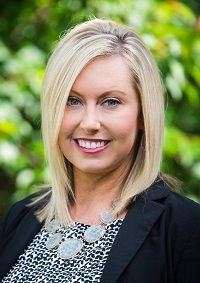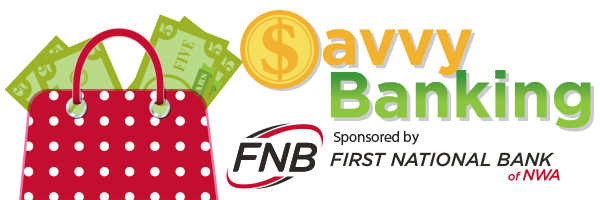Money. It’s on our minds a LOT, right?
That’s why we love this money advice category, Savvy Banking. Moms submit the questions and our sponsor, First National Bank of NWA, always does a great job of finding the best person at the bank to answer them.
Today we’ve got Holly Wheeler helping us out. Thank you, Holly! This month’s question is:
Q: What are the best ways to automate your savings so you build up an emergency fund or save for college, vacations, etc.?
Next to losing weight and eating healthier, saving money is one of the top New Year’s resolutions people make each year. Unfortunately it’s also one of the top commonly broken resolutions.
We all have good intentions, but sometimes good old-fashioned willpower just isn’t enough. Luckily, there are a couple of ways that you can easily automate your savings.
♦ Most banks will allow you to set up a recurring transfer from your checking account to your savings account at regular intervals – every week, every two weeks, every month, etc. Set up the transfer to co-inside with the days you get paid, and just think of it as another monthly bill you have to pay. However, in this case you are actually paying yourself.
♦ Another easy way to automate your savings is to set up a direct deposit with your employer that automatically splits part of your pay check between your checking and savings accounts. That way the money never goes into your checking account and you aren’t tempted spend it. Out of sight; out of mind.
♦ Some banks offer a variation of this. First National Bank of NWA has a Save the Change program that automatically rounds up every debit card purchase you make to the nearest dollar and puts the difference in your savings account. If you purchase something for $1.50, Save the Change would debit your checking account $2 and put 50 cents into your savings account. This is a great program for debit card users.
A good rule of thumb is to have enough money in savings to cover at least 6 months of living expenses, preferably a year’s worth, as a safety net for any unforeseeable emergencies. Additional savings could be earmarked for vacations, Christmas gifts, college, etc.
The trick to building your savings is not to touch it. If you decide to automate your savings by using one of these methods but continuously transfer some of it back to your checking account, you are defeating the purpose.
You can avoid the temptation by not linking your savings account to your debit/ATM card or by removing the ability to see your savings account on line. Most banks have these options available.
Good Luck and Happy Savings!!!
 Holly Wheeler is a Vice President of Lending for First National Bank of NWA She has 14 years of banking experience in the NWA market. She obtained her bachelors degree from the University of Arkansas and is an Honor’s Graduate from the Arkansas Bankers Association’s School of Lending. She is a Sustaining member and past board member of the Junior League of NWA, as well as the treasurer for both the NWA Delta Delta Delta Alumni Association and Housing Corporation. She is the proud mom to her sons Ross and Charlie and wife to her husband Britton.
Holly Wheeler is a Vice President of Lending for First National Bank of NWA She has 14 years of banking experience in the NWA market. She obtained her bachelors degree from the University of Arkansas and is an Honor’s Graduate from the Arkansas Bankers Association’s School of Lending. She is a Sustaining member and past board member of the Junior League of NWA, as well as the treasurer for both the NWA Delta Delta Delta Alumni Association and Housing Corporation. She is the proud mom to her sons Ross and Charlie and wife to her husband Britton.
Note from the mamas: Click here to read previous Q&As with First National Bank of NWA which focus on money questions like how much your child should save from that first summer job, pumping up your credit score and deciding how much house you can (really) afford.



